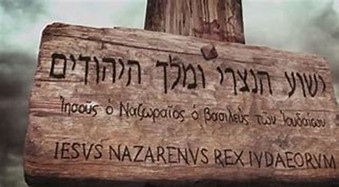This Sunday, the lectionary invites us to ponder Luke 23:33-43. The English Standard Version supplies the title “The Crucifixion” to verses 26-43.
In verse 26, we read that the Roman soldiers forced Simon of Cyrene to carry Jesus’ cross. This was because Jesus was too badly injured to carry it himself.
Like the other gospels, Luke’s gospel is very carefully crafted. The reason Luke tells us Simon was from Cyrene is important. He’s telling us that no one from Jerusalem helped Jesus.
Jerusalem, as Jesus predicted, and as I said last week, was destroyed. God caused Jerusalem to be destroyed. Destroyed because the city of God’s “chosen people” failed to recognize Jesus as the prophesied king, as the royal prophet. Instead, Jerusalem killed Jesus.
Today, I’ll highlight three things in the reading.
First, Jesus asked God to forgive the soldiers who carried out the crucifixions. Second, as the crucifixion progressed, the people began to put some distance between themselves and their leaders. Third, Jesus promised “paradise” to one of the criminals crucified together with him.
First, Jesus asked God to forgive the soldiers who carried out the crucifixions. Crucifixions, plural. Three today, perhaps several yesterday, more in days to come. Jesus asked God to forgive the soldiers who carried out crucifixions, a terrible punishment. One scholar tells us:
“… crucifixion was reserved … for those who resisted the authority of Roman occupation. Naked and fastened to a tree, stake, or cross, located typically at major crossroads, the victim was subjected both to a particularly abhorrent form of capital punishment and to optimum, savage ridicule. The corpse of the crucified was typically left on the tree to rot or as food for scavenging birds.”
Rome used crucifixions like today’s billboards – constant reminders. Constant reminders of what it would do to those who opposed its rule.
Even while nailed to the cross, Jesus continued his ministry of forgiveness – even for soldiers who didn’t express remorse, didn’t repent, of inflicting one of the most cruel forms of punishment every designed.
Second, the people began to put some distance between themselves and their leaders.
When Jesus entered Jerusalem, on a donkey, a crowd received him positively. But days later, a crowd asked Pilate to crucify Jesus.
As I said earlier, Luke intentionally, purposefully, tells us that a non-Jerusalemite was made to carry Jesus’ cross. But he also tells us, in verse 27, that “a great multitude of the people and of women” were “weeping and lamenting” for Jesus. And in verse 35 he tells us that “as Jesus was crucified, the people stood by, watching, but the rulers scoffed at him.”
The crowd observed Jesus, with a crown of thorns on his head, with a notice above him, proclaiming him “King of the Jews.” They observed how Jesus responded to those around him. What they observed caused them to withdraw support for their leaders. They didn’t join the scoffers.
Third, Jesus promised “paradise” to one of the criminals crucified together with him.
What did the criminal, the crowd, and Jesus understand by “paradise”? Paradise indicated creation before the fall. Entering paradise meant entering a new creation, a place of comfort and joy. In verse 43, we read that Jesus said the criminal would enter it instantly, “today.”
That strikes us as odd, because we know from the resurrection stories in the Bible, and from the Apostle’s Creed and the Nicene Creed, that Jesus himself only rose up from the dead on the third day.
It strikes us as odd because we forget that hanging on the cross, beaten, bruised, bleeding, choking, it was a struggle to speak.
Pause. Reflect.
Economy of words was important. “Today” signalled the certainty of eternal life.
Karl Barth pastored churches for many years before he became a university professor of theology. While professor, he often went to Basel prison, in Switzerland, and preached to criminals. Once, preaching from our text, at a Lord’s Supper service, he said to the criminals:
“Consider the fact: Jesus died precisely for these two criminals who were crucified on his right and on his left and went to their death with him.
He did not die for the sake of a good world, he died for the sake of an evil world; not for the pious, but for the godless; not for the just, but for the unjust; for the deliverance, the victory, and the joy of all, that they might have life.
These two companions were evidently and undeniably criminals, evil people, god-less people, unjust people. And he, like them, was condemned and crucified as a lawbreaker, a criminal. All three were under the same verdict.”
Consider that! What a friend, what a sacrifice, what a saviour, we have in Christ, our King!
Peace be with you.
To learn more about Rama, click here.



Pingback: Why Advent Begins with the End: A Lesson from Matthew – Bangsar Lutheran Church